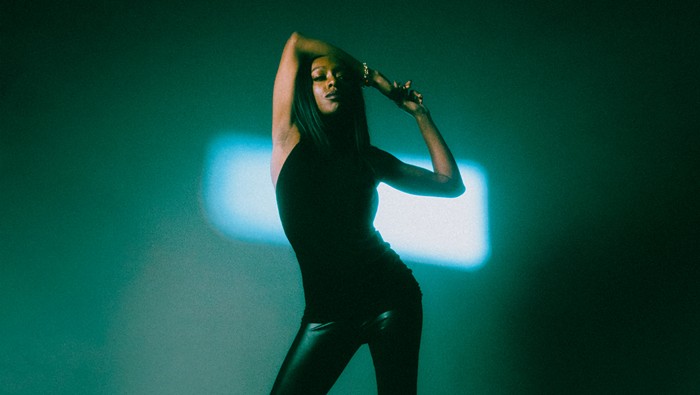JAZZ SINGERS aren't really in the business of showmanship. Rarely do you see them "work the crowd," trying to rouse an audience into a frenzied state. If there's passion to be incited, it tends to come solely from the power of their performance.
For as much as she is rattling the dusty bones of the jazz establishment, 24-year-old Cécile McLorin Salvant hews closely to this age-old performing style. Onstage she plants herself near her chief accompanist, piano player Aaron Diehl, and pours all of her emotion into her sumptuous, crystalline voice. But you can tell the music is moving her in a deep, deep way.
In a YouTube clip of a performance at Dizzy's Club Coca-Cola in New York, Diehl solos while Salvant closes her eyes and lets out little vocal exhortations: "Uh... uh-huh... mmm." If you attend an evangelical church, it's the kind of thing you might hear coming from members of the congregation during the sermon. And like those churchgoers, when those sounds come out of Salvant, it is an unconscious reaction.
"It's not that I think about it when it happens," she says, speaking from her apartment in Harlem. "I'll just react. I love that kind of give and take, though. I think that jazz, like any folk music, is one where you can participate even when you're not playing."
The stir Salvant is causing in the jazz community is based on the strength of her astonishing singing, which has been rightly connected to the lineage of singers like Ella Fitzgerald and Sarah Vaughan. Like those musical predecessors, Salvant's voice has many gears: sultry, coquettish, brash, operatic. And, like any great songster, she can shift between those moods with incredible ease, as on her recording of "What a Little Moonlight Can Do," found on her 2013 album WomanChild. She starts off cooing out the words, Billie Holiday-like, and ends the song with a spine-tingling flourish that challenges her upper register. It's a startling performance.
Salvant is also challenging jazz mores with the song selection on WomanChild. She willfully avoids the typical canon of standards, working instead with old blues numbers associated with Bessie Smith, like the slightly troubling "You Bring Out the Savage in Me."
"It's such an absurd, racist concept," she says of the tune. "But those are the songs that interest me, the ones that have a little edge to them. I wanted it to be something different from what you typically hear in vocal albums."
What has become quickly apparent is that Salvant is the perfect shot of youthful energy that jazz requires every few years to keep it moving forward and evolving. Whether she manages some kind of Norah Jones-style crossover success remains to be seen, but the establishment has already welcomed her into the fold. In 2010, she won the Thelonious Monk International Jazz Vocals Competition, and last year she was invited to perform with Wynton Marsalis' Jazz at Lincoln Center Orchestra.
Grateful as she is for all the attention, Salvant regards her increased profile with an understandable amount of caution. "The thing I fear most is this hype around me," she says. "If I have to see my face around all the time, I'll get really tired of it. Empty buzz like that is not the best for building a long career."



















